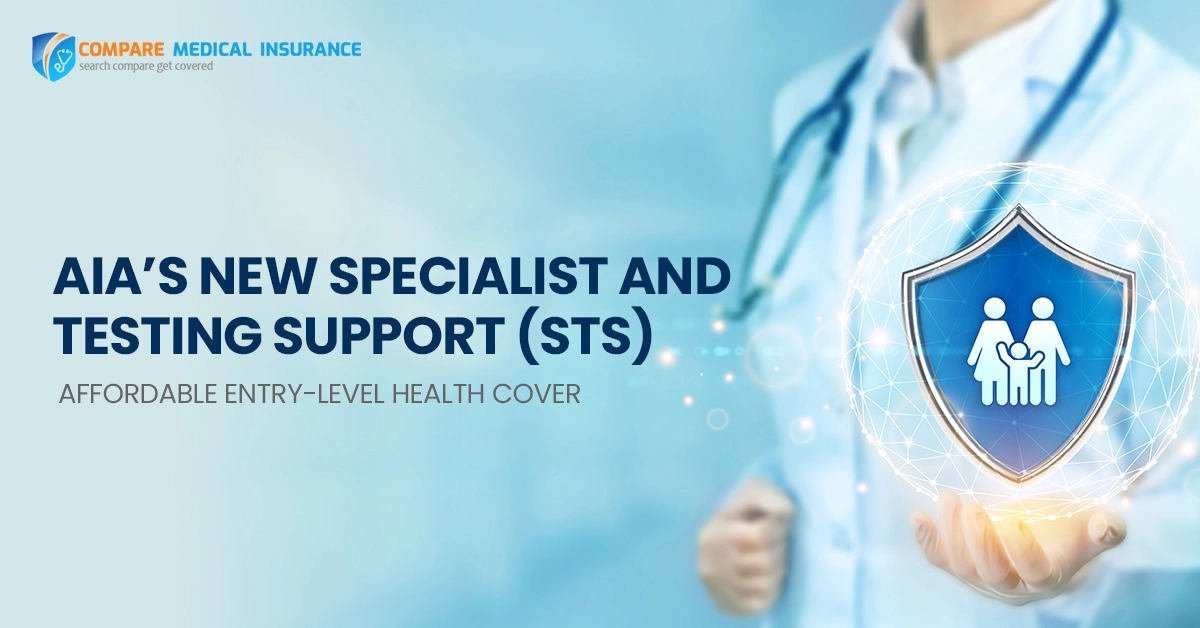AIA’s New Specialist and Testing Support (STS) – Affordable Health Cover
Introduction
AIA New Zealand has launched a new entry-level health insurance benefit called Specialist and Testing Support (STS), effective 1 October 2025. This benefit is designed to make private healthcare more accessible and affordable for Kiwis who may not want or need full comprehensive health insurance.
What is STS?
It’s a flexible add-on that pays for specialist consultations and diagnostic tests, without needing a full hospital cover plan. In essence, it helps customers get timely diagnoses for health issues while bridging the gap between public system wait times and costly private care.
Why now? With rising living costs, many New Zealanders are reconsidering or dropping their private health insurance. At the same time, the demand for the public health system is causing longer wait times for specialist appointments and tests. STS addresses these challenges by offering a low-cost option for early diagnosis – giving peace of mind and quicker answers without the expense of full coverage.
Unique in the market: “At launch, AIA NZ stated that no other insurer in NZ currently offers a standalone specialist-and-testing cover separate from comprehensive health insurance. This makes STS a notable innovation aimed at retaining customers who might otherwise cancel their health policies and attracting those seeking cheaper alternatives.
If you’re curious about how AIA’s STS compares with other health insurance options, you can Compare Now using our free New Zealand insurance comparison service.
What Exactly Does the STS Benefit Cover?
- Specialist Consultations: Up to $10,000 per year for consultations with specialists (e.g. cardiologists, gastroenterologists, gynaecologists, ENT specialists, etc.), as long as a GP or medical practitioner refers you. This ensures that if you need to see a specialist privately, the cost is covered up to that limit each year.
- Diagnostic Tests & Procedures: Up to $100,000 per year for a wide range of diagnostic investigations and outpatient procedures (AIA). This includes costly tests like MRI, CT and PET scans, colonoscopies, ECGs, blood tests, biopsies, and more – again when referred by a doctor. Essentially, most imaging, laboratory tests, and scopes you might need for diagnosis are covered.
- Obstetrics and Infertility Treatment: After 2 years of continuous cover, STS will contribute up to $1,500 per year toward pregnancy-related care or infertility diagnosis/treatment (such as obstetric ultrasounds or fertility tests). Note that $1,500 is also the maximum per pregnancy for obstetric claims – a modest benefit, but a helpful supplement for starting families.
- Health Screening Allowance: The policy includes a preventive care feature – up to $500 towards approved health screening tests every 3 years (or up to $750 every 3 years if you are an AIA Vitality wellness program member). This can cover proactive screenings like bowel cancer checks, mammograms, heart checks, skin cancer screenings, etc., encouraging you to catch potential issues early.
- Excess Options (Deductibles): When you take out STS, you choose an excess of either $0 or $250 per policy year. The excess is the amount you pay out-of-pocket on claims each year before the benefit kicks in. Opting for the $250 excess will reduce your premium by roughly 15% (making the cover even more affordable). In contrast, a $0 excess means you have no out-of-pocket for covered claims but premiums will be higher. This flexibility lets you balance upfront cost vs. pay-as-needed.
- Speedier Diagnosis: Importantly, STS is designed to help you bypass long public hospital waitlists for diagnostics. Covering private specialist visits and tests, it enables you to get answers sooner and start treatment earlier if needed. Even though STS doesn’t pay for the treatment itself (more on that later), having a diagnosis in hand can get you onto the public treatment waitlist faster or allow you to make informed decisions sooner.
Who Can Get STS and How Does It Work? (Eligibility & Add-On Structure)
- Add-On to Life/Trauma Cover: Specialist and Testing Support isn’t sold as a standalone policy by itself; it is offered as an optional add-on (rider) to eligible AIA insurance policies. You can attach STS to certain AIA Living plans – specifically, if you have (or purchase) an AIA life insurance, trauma (critical illness) insurance, income protection, or total permanent disablement policy, you likely can add STS to that coverage. (There are minimum cover amount requirements for those base policies to qualify – an insurance adviser can confirm your eligibility.)
- Not for Starter or Existing Health Policies: You cannot add STS to AIA’s Starter Plans or to a comprehensive Health Insurance policy. This product is aimed at those without full health insurance, so it’s mutually exclusive with having a standard health plan. It’s more like a light alternative, not a supplement to an existing hospital cover.
- Age Limits: The minimum entry age is 3 months old, and the maximum entry age is 70 years for STS. Specialist and Testing Support]
- Medical Underwriting: As with any insurance, signing up for STS will involve health questions and possibly exclusions or loadings based on your medical history. Since it’s providing health-related cover, AIA will assess your risk (this is standard procedure). Pre-existing conditions might not be covered immediately or might be excluded, depending on the underwriting rules (details would be in the policy wording).
- How to Buy: If you’re an existing AIA customer with an eligible policy, you can talk to your adviser about adding STS to your coverage. If you’re new to AIA, you would purchase a base AIA policy (life, trauma, etc.) and then include STS as an additional benefit on that policy. It’s a way to bundle coverage for both life risks and health diagnostics in one package.
- No Other Insurer Equivalent: AIA highlights that no other NZ insurer currently offers a comparable benefit that covers only specialist and test fees without full health insurance. This means if you’re specifically interested in this kind of “diagnostic-only” cover, AIA STS is uniquely positioned in the market in 2025. (Competitors generally offer comprehensive health insurance or nothing; they don’t have a stripped-down version like this.)
Considering adding this benefit or looking at alternatives? Compare Now through our platform to see how AIA’s offering stacks up against other health insurance solutions in New Zealand.
What’s Included vs Not Included in STS Coverage
✅ Covered Services (Summary): Broadly, STS covers the consultation fees for specialists and the costs of approved diagnostic procedures in New Zealand, up to the yearly limits noted ( \$10k for specialists, \$100k for tests ). This encompasses a long list of investigations – e.g. blood tests and lab work, X-rays and ultrasounds, MRIs and CT/PET scans, colonoscopies and endoscopies, mammograms, heart monitoring tests, allergy tests, biopsies, etc. – basically, if it’s a diagnostic test prescribed by a doctor, it’s likely covered (the policy documentation provides a full list of covered diagnostic procedures).
✅ Additional Benefits: The health screening allowance (for routine preventive checks every few years) and the maternity/fertility allowance (after 2 years) are included extras with their own sub-limits, as described earlier. These show that STS isn’t just for acute diagnostics, but also supports proactive health measures and family planning needs (albeit in a limited way).
❌ Not Covered – Treatment & Hospitalisation: It’s important to note that STS does not cover the costs of actual medical treatments or surgeries if a health issue is found. For example, if your private specialist consultation and scan under STS result in a diagnosis that you need surgery or chemotherapy, STS would not pay for those treatment costs. At that point, you would either rely on the public health system for treatment (which is the intent – get diagnosed early, then use public hospitals for the procedure) or you’d need to have separate comprehensive insurance or funds to cover treatment privately. STS is purely focused on the diagnosis stage of care, not the treatment stage.Treatment coverage would require a separate AIA Private Health or other hospital policy.
❌ Not Covered – General Healthcare: This benefit also doesn’t cover GP visits, prescriptions, physiotherapy, dental, optical, or other general outpatient care. Those fall outside the scope of specialist consultations or diagnostic tests. It’s a lean policy meant for serious investigative healthcare needs rather than everyday health maintenance.
❌ Other Exclusions: Like all insurance, STS has specific exclusions and limitations. For instance, it only covers services done within New Zealand – any specialist consults or tests you seek overseas would not be claimable. It likely also excludes elective or cosmetic procedures, experimental treatments or tests not clinically indicated, etc. (The exact list of exclusions would be detailed in AIA’s policy wording document, which should be consulted for full information.) Pre-existing conditions may be excluded or have waiting periods. Additionally, you cannot claim costs if you don’t have the proper referral from a GP/specialist; self-referred tests or unofficial procedures wouldn’t be covered.
Bottom Line: STS covers a wide range of diagnostic services to get you answers and diagnoses quickly, but it will not cover the follow-up treatment or any unrelated medical expenses. It’s meant to pair either with public healthcare (for treatment) or with other insurance if you have it. Understanding these boundaries is key so you have the right expectations.
Pros and Cons of AIA’s Specialist and Testing Support
Pros of Specialist and Testing Support (STS) :
- Significantly Lower Cost vs Full Health Insurance: Because STS only covers diagnostics and specialist consults (not expensive surgeries or hospital stays), its premiums are much more affordable than comprehensive health insurance plans. This makes it an attractive option for people who find full private health cover too expensive but still want some protection. You’re paying only for the part of coverage you’re likely to use to get a diagnosis, which can save money on premiums.
- High Coverage Limits for What It Covers: The annual limits – $10,000 for specialists and $100,000 for tests – are quite generous. In practice, this means almost all your specialist visit fees and diagnostic test costs would be covered in full, since it’s uncommon to exceed those amounts in a year for diagnostics. (For perspective, an MRI might cost ~$1,000 and a specialist consultation a few hundred dollars; the limits are designed to cover multiple such appointments if needed.) This provides peace of mind that you won’t be out-of-pocket for big medical expenses.
- Fast-Tracked Healthcare and Early Detection: By enabling private specialist access, STS helps you avoid long wait times in the public system and get health issues identified sooner. Early detection can lead to better outcomes – even if treatment is done publicly, catching a condition months earlier can be critical. In this way, STS can indirectly contribute to better health results by expediting the diagnostic process.
- Flexible and Customisable: You can choose your excess ($0 or $250) to adjust premiums to your budget, and you can also potentially benefit from AIA’s multi-policy discounts (if you hold other covers) and AIA Vitality premium discounts. For example, suppose you bundle STS with life insurance. In that case, you might get up to 15% off via AIA’s multi-benefit discount, and AIA Vitality members get an initial 10% off premiums (with up to 20%+ in future years depending on your health program engagement). These can make the coverage even more affordable over time.
- Broad Eligibility and Use Cases: STS is positioned as useful for a wide range of customers, from young people who are just starting out and want “simple, affordable support” for their health, to older individuals who need to cut costs but still want access to specialist care. It can be a good retention tool for those who feel they must cancel full health insurance due to cost – STS gives them a cheaper fallback option to maintain some private cover. In essence, it’s a “middle ground” product that can fit many situations: a starter health plan for the young and budget-conscious, or a partial cover for retirees scaling down their insurance.
Cons of Specialist and Testing Support (STS):
- No Cover for Treatment/Hospital Bills: The flip side of STS’s focus is that if your tests find something serious, you’ll still face the challenge of paying for treatment (or relying on the public system queues). Unlike comprehensive health insurance, STS won’t pay for surgeries, cancer treatments, hospital stays, specialist follow-up procedures, etc. This could be a major drawback if you end up needing those; you might have to join waiting lists or find funds. So, STS doesn’t provide the “complete peace of mind” that a full health insurance policy would – it’s a more limited safety net.
- Must Be Coupled with Another Policy: You cannot purchase STS entirely on its own – it’s an add-on to another insurance product. This means if you currently have no life or trauma cover (and don’t want any), you’d have to buy one to get STS, which is an extra step and expense. Some consumers might find this inconvenient if their only interest was the health cover aspect. Essentially, AIA designed STS to complement their life insurance lineup, so it’s not a standalone product.
- Not a Substitute for Comprehensive Cover in Some Cases: If you have significant health risks or want coverage for things like elective surgeries, private hospital rooms, physio or ongoing therapies, STS won’t meet those needs. It’s not intended to replace full health insurance for people who truly need extensive cover. For instance, someone with a known medical condition may still require a comprehensive health policy; STS would leave gaps for them. It’s best suited for those with currently good health who want to insure against the possibility of something serious being discovered, rather than those already facing known treatments.
- Waiting Periods and Limitations: STS has a 2-year waiting period for maternity and fertility benefits, meaning you can’t claim those in the first two years of the policy. This could be seen as a con for young couples wanting immediate pregnancy coverage (though such waiting periods are standard in health insurance to prevent anti-selective claims). Also, the $1,500 limit on obstetric care is relatively low – childbirth and fertility procedures can cost much more, so this benefit covers only a fraction. There may be other waiting periods or specific exclusions defined in the policy (e.g., possibly a stand-down period for pre-existing conditions or certain specified ailments), so it’s not “instant cover” for every scenario.
- Age Cap for New Entrants: The maximum entry age of 70 could be a con for seniors above 70 who might want this coverage but can’t obtain it new. Additionally, as one ages, premiums will increase and coverage might become less affordable on fixed incomes (though that’s a general insurance consideration, not unique to STS). Still, compared to comprehensive plans, STS should remain cheaper even at older ages, but older individuals need to be aware of the entry age restriction.
- No International Coverage: For those who travel or might consider getting tests done overseas, STS won’t help – it only covers services within New Zealand. If you became ill abroad or wanted to take advantage of potentially cheaper scans in another country, you’d be out of luck with this policy. Comprehensive international health insurance or travel insurance would be needed in those cases.
Conclusion
AIA’s Specialist and Testing Support (STS) is a notable new offering in 2025 that fills a gap between having no health cover and having full private health insurance. It’s essentially a “diagnostic insurance” – ensuring you can afford to find out what’s wrong if you get sick, without breaking the bank on premiums. This helps many people who are priced out of comprehensive cover to gain some control over their healthcare journey still. In an environment where medical costs are rising and only a minority of Kiwis have private health insurance, STS provides a welcome middle-ground solution.
By covering specialist consults and tests, STS complements the public health system: you use it to get prompt answers privately, then you can leverage public hospitals for treatment if needed. This can relieve some burden on the public system (fewer people waiting just for diagnostics) and empowers customers with more choice and faster service. It’s also a savvy response to consumer and adviser feedback for more flexible, budget-friendly insurance options.
Is STS right for you? It could be ideal if you want affordable coverage for “finding out what’s wrong” but are okay relying on the public system (or personal savings) for the actual treatment. It won’t be enough if you desire full private medical care for any condition, but it could be a lifesaver for early detection and peace of mind. Ultimately, the decision might come down to your health needs, financial situation, and what other coverage you have. We always recommend comparing different insurance options to see which plan best fits your requirements.
Ready to see how AIA’s STS stacks up against other health insurance plans? Use our free tool to Compare Now and make an informed choice. With the right information at hand, you can secure the health cover that gives you confidence in your future well-being, at a price point you’re comfortable with.





